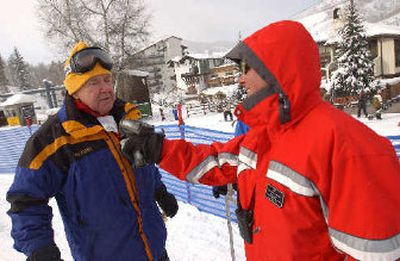Vail is expensive — and proud of it

DENVER — Businesses usually don’t trumpet having the highest price around, but in the ski business it’s become something to brag about.
Vail Resorts, one of the jet set’s favorite winter playgrounds, announced Wednesday that the top lift ticket price at its Vail and Beaver Creek ski areas will be $81 a day — $3 more than Aspen, its nearby competitor for the high-end skier.
The CEO of Vail Resorts, Adam Aron, said the company invested more than $100 million at its resorts this summer and “it is reasonable to put in a modest price increase to get a return on the investments.” Spokeswoman Kelly Ladyga also said the resorts are paying more for energy.
But Aron contends there is also a “certain cachet” to charging top dollar.
“Vail and Beaver Creek do have the highest lift ticket price in the United States. And yes, we’re actually — as opposed to hiding from that fact — we’re proud of that fact,” he said. “If the resort is capable of successfully charging the highest lift ticket prices in the country, that may be an indicator that it really is the best vacation experience.”
Maybe so, but some snowriders were stunned by the news.
“I think it is outrageous,” said Sarah West, 25, a snowboarder from suburban Denver who was at the Loveland ski area Thursday. “I don’t think I would ever go, ever. You’d have to have gold snow to make it worth it.”
Vail’s big-name competitors, from Mammoth Mountain in California to Stratton in Vermont, charge in the low $70s for a single-day peak season ticket. Idaho’s Sun Valley charges $69, while Jackson Hole in Wyoming charges $73. Smaller areas, like Loveland and Arapahoe Basin in Colorado, charge around $50 during peak season.
At Aspen, which has had the highest single-day price in many previous seasons, executives said they were happy for Vail to have “the dubious honor” this year.
“It can make your brand inaccessible to people,” said David Perry, Aspen vice president for marketing. Still, he acknowledged the top price does carry some prestige.
“Ferrari is not ashamed to charge half a million dollars for one of their cars,” he said.
Stuart Rempel, vice president for marketing and sales at Canada’s Whistler-Blackcomb resort, said he was not surprised by Vail’s rate increase because the larger, more famous U.S. resorts have been raising prices. Utah’s Deer Valley, for example, this season raised its top rate from $71 to $74.
“I think the reason we do significantly more visits than any other resort in North America is because of the value of the product we offer and the price we charge for it,” Rempel said. The peak ticket price at the Canadian resort is the equivalent of $65 in U.S. dollars.
Despite the rising price of single-day tickets, the ski industry nationwide has been in a discounting war since 1999, when some Colorado resorts cut season passes to as low as $300 from their standard rate of $800 or more.
David Dillon, president of the trade organization Ski Vermont, said season passes and multi-ticket deals mean few snowriders actually pay the full ticket window price. Tourists get lift tickets as part of a travel package or seek other discounts.
“There is no reason to pay full walk-up rates for lift,” Perry said. “All you have to do is the tiniest bit of advance planning.”
Aron predicted Vail and Beaver Creek will sell nearly 2.5 million lift tickets despite the high price.
Ski analyst Will Marks of JMP Securities was skeptical that raising prices alone would do much for business, though he said if it would help anybody it might be Vail, “due to the multimillionaire and billionaire clientele.”
“Vail can justify (it) due to the quality of its mountain and the resort itself, and its traditional customer base,” he said.